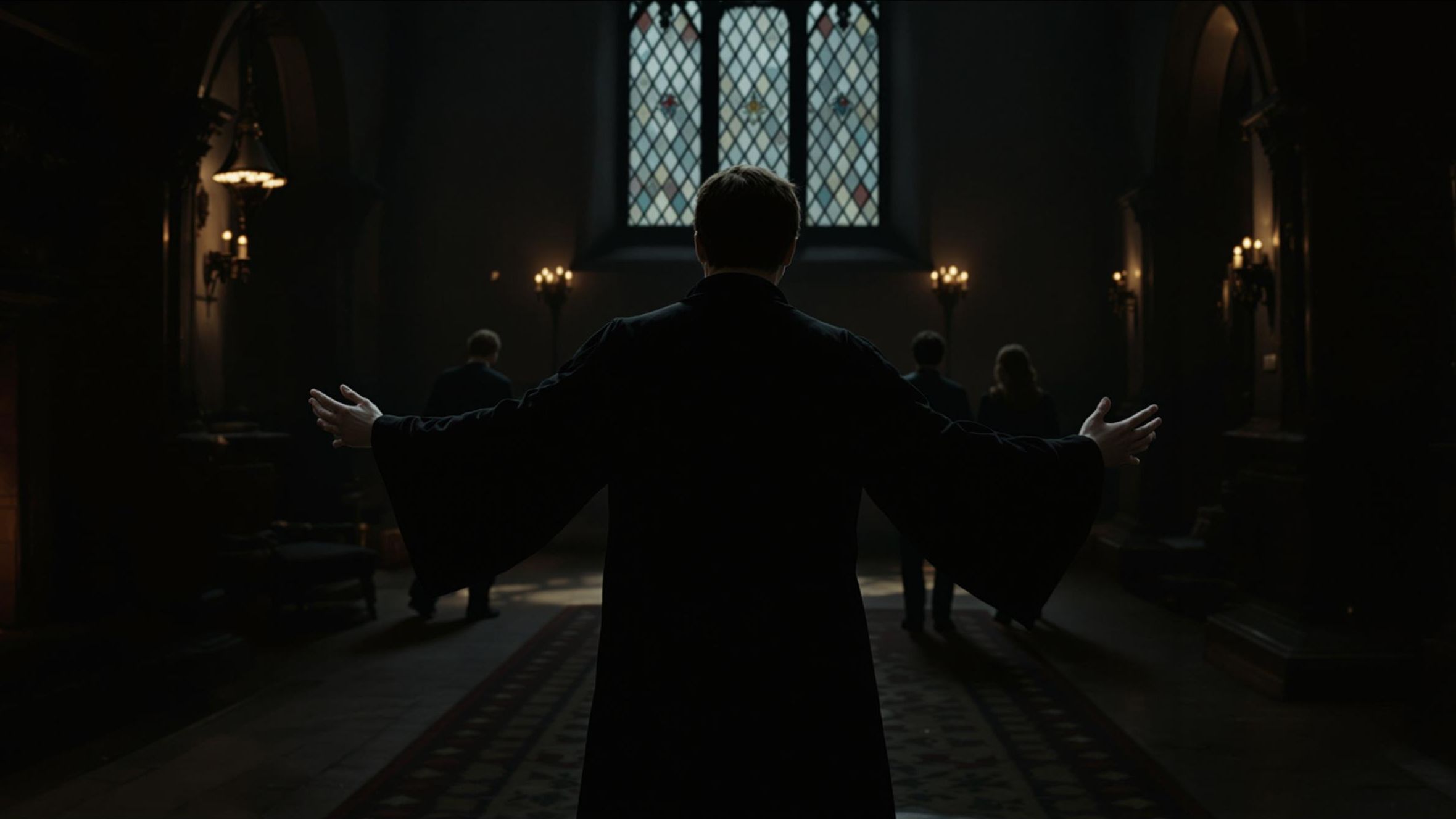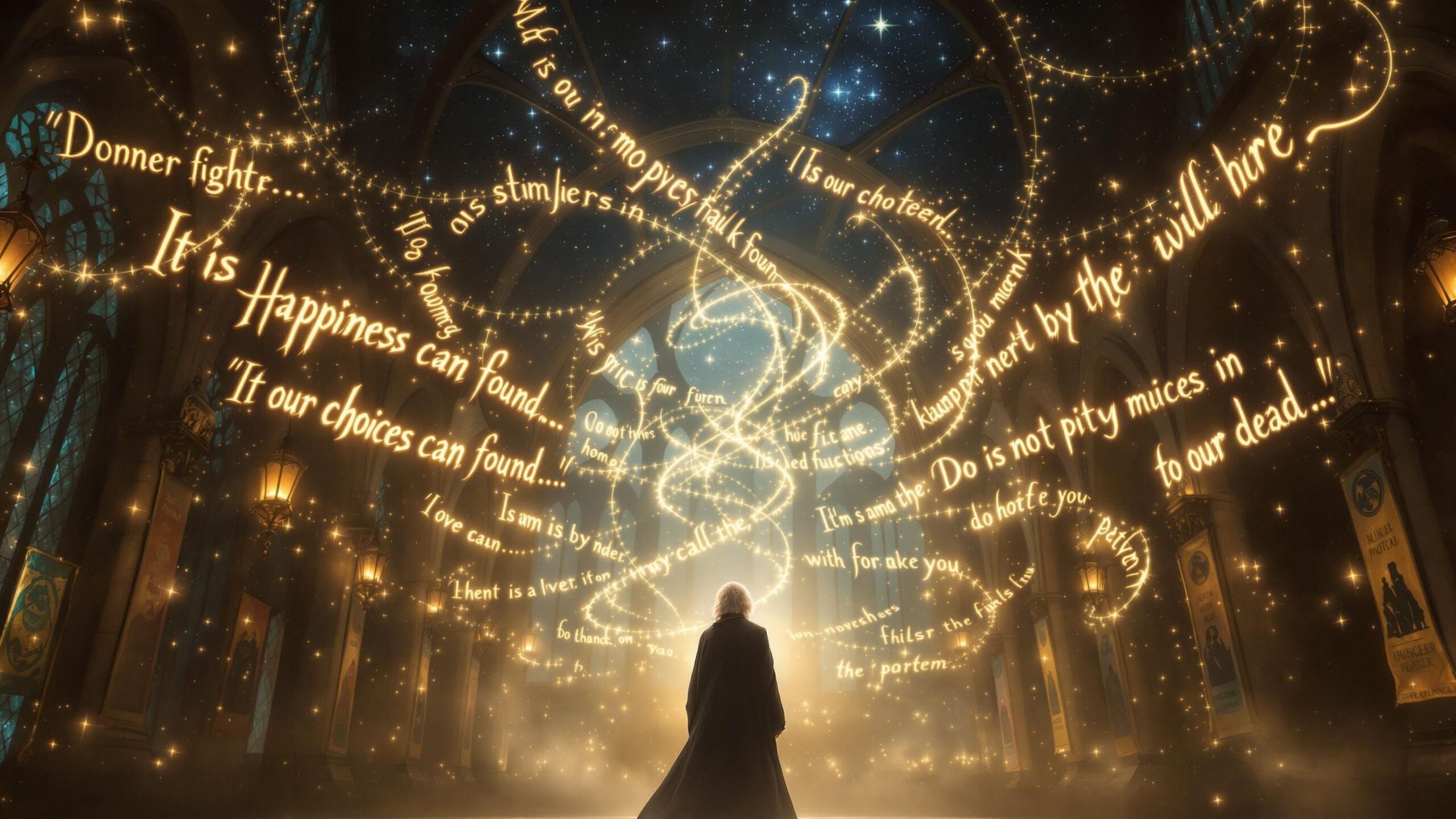When readers first met Neville Longbottom, he seemed like the least likely hero at Hogwarts. Shy, forgetful, clumsy, and perpetually losing his toad, Neville was often dismissed—even by himself. But underneath the nervous exterior was a lionhearted Gryffindor with immense strength, resilience, and unshakable loyalty. His journey from fumbling first-year to fearless freedom fighter is one of the most powerful arcs in the Harry Potter series. Time and time again, Neville stood tall when others cowered, fought when it was easier to flee, and believed in doing what was right—no matter the cost. These ten unforgettable moments prove that Neville Longbottom was never just a side character or comic relief. He was, in every sense of the word, a true hero.
#10: Standing Up to the Trio (Philosopher’s Stone)
Neville’s first act of heroism came not on a battlefield, but in the Gryffindor common room. When Harry, Ron, and Hermione prepared to sneak out at night to protect the Philosopher’s Stone, Neville stood in their way—not because he understood the full stakes, but because he believed rules mattered and didn’t want them to cost Gryffindor the House Cup. “I’m not letting you do this,” he said, trembling but determined. It would have been easier to hide in bed, but Neville summoned every ounce of courage to confront his friends. Dumbledore later awarded him ten points for this act, saying, “It takes a great deal of bravery to stand up to our enemies, but just as much to stand up to our friends.” That moment planted the first seed of Neville’s heroism: a quiet courage rooted in integrity and heart.
#9: Joining Dumbledore’s Army (Order of the Phoenix)
In Order of the Phoenix, Neville didn’t just join Dumbledore’s Army—he threw himself into it. Frustrated by his lack of progress in classes and driven by a desire to fight injustice, Neville became one of the most dedicated members of the secret group. Under Harry’s mentorship, he practiced relentlessly, mastering spells that had once eluded him. He improved faster than almost anyone else, showing that his determination was stronger than any magical limitation. Neville’s presence in the DA was about more than self-improvement—it was a declaration. He was ready to fight for what he believed in. His transformation during those meetings wasn’t flashy, but it was deeply inspiring. He stopped seeing himself as a liability and began seeing himself as a defender of what’s right. The DA became his crucible, and Neville emerged from it not just more skilled—but more confident, more focused, and more fearless.
#8: Battling Death Eaters in the Department of Mysteries
Neville truly came into his own during the mission to the Department of Mysteries in Order of the Phoenix. When he chose to accompany Harry, he wasn’t just tagging along—he was committing to a dangerous fight with full knowledge of the risks. Once inside, Neville held his ground against fully grown Death Eaters. Despite being injured—his nose broken, wand damaged—he refused to back down. He stood beside his friends even as they were outnumbered, outmatched, and nearly overwhelmed. He kept trying to help, to duel, to protect others, even when his spells sputtered. When it mattered most, Neville fought through pain and fear. He didn’t wait for someone else to be the hero—he became one in that moment. And though he wasn’t the most powerful wizard in the room, he showed more grit and heart than most. It was a defining moment: the beginning of the Neville Longbottom who would later lead a resistance.
#7: Facing Bellatrix Lestrange
Neville’s connection to Bellatrix Lestrange wasn’t just personal—it was searingly painful. She was the Death Eater who tortured his parents into insanity, leaving them permanently damaged. And yet, when he came face to face with her in battle, Neville didn’t cower. In the Department of Mysteries, he stood toe-to-toe with her, defiant and determined, even as she sneered at his perceived weakness. Bellatrix underestimated him, mocking his efforts, but Neville’s bravery shone through. Facing your family’s tormentor requires a specific kind of strength—one born not of rage, but of resolve. Neville didn’t fight her for vengeance; he fought because it was right. Even when she tortured him with the Cruciatus Curse, he refused to give her the satisfaction of victory. That strength of will, that emotional fortitude, proved that Neville wasn’t fueled by revenge—he was driven by justice.
#6: Defending Hogwarts While Harry Was Gone
In Deathly Hallows, when Harry, Ron, and Hermione were off hunting Horcruxes, Neville became the heart of the resistance inside Hogwarts. With Snape as headmaster and Death Eaters enforcing cruel rules, the school became a place of fear and suffering. But Neville, alongside Luna and Ginny, created a new version of Dumbledore’s Army. He led secret meetings, protected younger students, sabotaged the Carrows, and became a symbol of hope for the oppressed. He endured beatings, threats, and starvation—but never gave in. His dormitory became a safe haven, and his leadership kept the spirit of rebellion alive. When the trio returned, they didn’t find a scared, uncertain boy—they found a hardened leader who had kept the fight alive in the darkest of times. His courage wasn’t flashy. It was steadfast. He was the face of Hogwarts’ resistance—bruised, battered, but unbroken.
#5: Standing Up to the Carrows (Deathly Hallows)
During Snape’s reign as Headmaster in Deathly Hallows, the Carrow siblings, Amycus and Alecto, were appointed to teach Dark Arts and enforce twisted discipline through fear and violence. Neville not only resisted them—he actively sabotaged their efforts. He led DA missions to destroy their control, encouraged other students to speak out, and bore the punishment time and again. He was beaten, tortured, and humiliated—but he never stopped fighting. One of the most telling signs of Neville’s bravery came when he refused to use the Cruciatus Curse on fellow students, a punishment the Carrows demanded. While others might have broken under pressure, Neville took the pain instead, protecting others from harm. And when they threatened his grandmother, Augusta Longbottom, hoping to use her as leverage, Neville simply responded that she could take care of herself—and she did, escaping capture. That iron resilience, both physical and emotional, showed Neville as a true leader, someone who resisted not just physically, but morally, too. He didn’t just rebel—he protected.
#4: Returning to Hogwarts for the Final Battle
When Voldemort’s forces descended on Hogwarts, Neville didn’t hesitate—he rallied. Upon learning Harry was returning, Neville used the enchanted Galleons from the original DA to summon reinforcements. The Room of Requirement became a refuge for rebels, with Neville at the center. His leadership in these moments was both strategic and deeply personal. He wasn’t trying to be the star—he was simply trying to protect his school and the people in it. He welcomed every returning ally, coordinated supplies, and stood ready to fight even before the rest of the Order arrived. For many, war meant fear. For Neville, it was a moment of clarity. He didn’t need a prophecy, a famous name, or a chosen destiny. His bravery was entirely self-made. He stepped into the storm not for glory, but because it was his school, his friends, and his home. And he wasn’t going to let it fall without a fight.
#3: Killing Nagini
Arguably Neville’s most iconic moment came during the Battle of Hogwarts when he pulled the Sword of Gryffindor from the Sorting Hat and beheaded Nagini, Voldemort’s final Horcrux. It was a moment of stunning cinematic and symbolic power—Neville, the once-timid boy who couldn’t hold onto a toad, rising as the unexpected savior. He didn’t flinch. He didn’t question. With fire blazing around him and death all around, Neville delivered a critical blow to Voldemort’s immortality. That act of courage wasn’t just an act of violence—it was an act of redemption and destiny. He proved that bravery isn’t about grand speeches or perfect skill—it’s about doing what needs to be done, when no one else can. Pulling the sword from the hat, an act reserved only for true Gryffindors, sealed his place in magical history. In that moment, Neville Longbottom wasn’t the sidekick. He was the hero.
#2: Remaining Humble Through It All
What makes Neville’s heroism even more remarkable is his consistent humility. He never sought fame, never used his last name for favor, and never let his triumphs change his core. After the war, he didn’t boast or seek recognition—he became a beloved Herbology professor at Hogwarts, choosing a life of teaching, nurturing, and mentoring others. In a world where many could have cashed in on war stories, Neville chose to help the next generation grow. His humility, compassion, and loyalty made him not just a hero of war, but a builder of peace. He carried the weight of trauma, loss, and responsibility with quiet grace. His choice to return to Hogwarts as a professor brought his story full circle—from the struggling student to the wise mentor, guiding others with the same warmth and wisdom that had once saved him.
#1: Becoming the Hero He Didn’t Think He Could Be
The most powerful part of Neville’s journey is that he never believed he was a hero—yet he became one anyway. He was born into a prophecy that could have made him the Chosen One, raised by a grandmother who doubted his potential, and haunted by parents who had been broken fighting the very war he now faced. And yet, without the spotlight or the prophecies or the fanfare, Neville made choices every step of the way that led him to greatness. He faced his fears, stood up for what was right, and inspired countless others to do the same. His evolution is the most emotionally satisfying in the entire series because it mirrors what so many people experience in real life: overcoming doubt, finding your voice, and realizing that you are stronger than you think. Neville didn’t need to be “chosen” to be brave. He just had to choose to be brave.
Neville Longbottom’s journey isn’t just one of magical growth—it’s one of emotional resilience, moral strength, and quiet transformation. He didn’t wear his bravery like a banner; he lived it. From standing up to his friends in Year One to standing up to Voldemort in Year Seven, Neville proved again and again that real heroism isn’t always loud or celebrated. It’s often in the quiet choices, the painful sacrifices, and the relentless belief in doing what’s right. He reminded readers that courage comes in many forms—and that even the most unlikely among us can rise to greatness. Neville wasn’t just brave—he was braver than all of them. And that’s why he remains one of the most heroic characters in the wizarding world.




